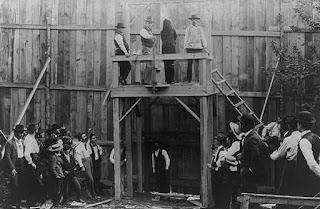Views of a hanging
by
Bill Miller for the Mail Tribune
Monday, April 15th 2019
The
most interesting part of the story about Southern Oregon’s first hanging is how
many variations to the story there actually are. No one can even agree where in
town the hanging took place.
In
May 1852, Jacksonville was a mini boomtown of about 400 miners and businessmen,
no “respectable” women, and a small contingent of “camp followers” we never
seem to hear about.
In
the midst of a few shacks and tents, and nothing that looked like a real
street, stood the “Round Tent,” a place to kick back in the evening with a
drink, some company, and a card game.
The
only part of this hanging story that everyone seems to agree on is that one man
shot another man dead in the tent, and after a jury trial, Jacksonville’s
first, the shooter was quickly hanged.
The
murdered man was either Sam Potts, Plot, or Platt. Another account simply calls
him “the Big Missourian.” Whatever his real name, they say he settled on land
just north of Ashland, although even that can’t be confirmed.
The
shooter was John Brown, but, then again, just before his hanging, he apparently
told everyone his real name was Jackson Maynard. That agrees with the earliest
found report of the hanging, a June 1852 edition of the Oregon Statesman
newspaper.
Reports
of the incident by A.G. Walling, in his 1884 “History of Southern Oregon,” and
Oregonian articles by early Jackson County residents William Plymale, in 1903,
and Eli Anderson, in 1910, all blame Maynard for the incident. Eli Anderson had
a front-row seat. He was not only on the jury that convicted Maynard, he also
witnessed the hanging.
“It
was shown at the trial that murderer Brown [Maynard] was a worthless young man
who loafed about the saloons and gambling places,” Anderson said. “A miner
named Potts was shot dead, without provocation,” wrote Walling. “Potts made no
attempt to assault Maynard,” Plymale wrote, “he was shot without provocation
other than words, and Maynard was quite as offensive as Potts.”
The
only defense Maynard received was written in Herman Reinhart’s memoirs.
Reinhart had worked a gold claim next to Maynard in Siskiyou County,
California.
“He
had come out in 1849 or 1850,” Reinhart said. “He was a good foot racer and
rassler [sic]. If he had a cool, fair and impartial trial, he might have been
cleared. But he was in a manner justified, for he had great provocation.”
Reinhart
described Potts as a man standing taller than 6 feet and weighing over 200
pounds who had been drinking and bragging that he could outrun, out-jump, and
whip anyone in town.
Potts
challenged Maynard to a race, but Maynard refused, saying he was sick and
couldn’t run. Potts was sure Maynard was afraid of him and began cursing,
calling Maynard a son of a female dog, a horse thief, “and abused him to
whatever he could lay his tongue to.”
Maynard
raced away, retrieved a navy revolver, put it under his shirt, returned to the
“Round Tent,” and dared Potts to repeat his words. Potts came forward,
expecting a fist fight. Maynard pulled his pistol and shot Potts through the
heart.
The
miners formed a vigilance committee and the jury convicted Maynard, sentencing
him to hang.
Reinhart
believed the only reason for the hanging was the appearance in Jacksonville of
Potts’ wife and her children a short time after the deadly confrontation.
“All
the miners sympathized with the widow and her three children,” Reinhart said,
“and agreed her husband had been cruelly murdered by a gambler.”
Reinhart
said that before Maynard died, he told the crowd, “I think I done right and, if
it was to be done over, I would do the same.”
“
He
bid his friends goodbye,” Reinhart said, “and he died game.”
Writer
Bill Miller is the author of “History Snoopin’,” a collection of his previous
history columns and stories. Reach him at newsmiller@live.com or
WilliamMMiller.com.




